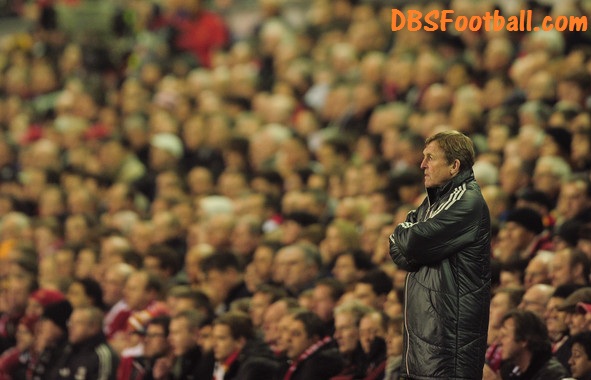When Kenny Dalglish returned to Liverpool just over a year ago during the aftermath of a tempestuous time of unrest and uncertainty, the fans were enlivened by his presence. His legendary status at the club energized them because of the security and status they hoped he would restore into a team which had dropped into the relegation zone under the management of Roy Hodgson for the first time in 46 years.
Around 14 months later, a brief glance into Liverpool's trophy cabinet could tell you that he has been a relative success. Another Carling Cup trophy has been added to a collection of silverware which had been collecting layers of dust due to Liverpool's baron spell of trophy winning, yet this is not how Dalglish believes his time should be measured.
Whilst the majority of club owners, managers and fans see the collection of League points and the winning of trophies as the central tenet of a successful football club, Dalglish apparently sways from that popular view. Instead, he believes, somewhat puzzlingly, that his success as his second spell as Liverpool manager should be judged by the improved state of a club that was in decline before he took over.
He mentioned how everybody at Liverpool are now all "in it together", that off the pitch, the club is "a lot stronger than it was", and highlighted how much money the club is making through sponsorship and kit deals. He also pointed to the academy, claiming the quality of it has improved and that "most of the people [at Liverpool] have got a smile on their faces."
"The squad is stronger than it was last year," he said "What other areas are there to improve on - apart from points?" Before I challenge this quite remarkable statement, I will suggest that everything Dalglish claims to have improved in his time at Liverpool are all rather flimsy, to an extent insignificant, and in terms of winning - considered as the most important thing in football - meaningless. His use of rhetoric in that the club are "all in it together" and "everyone has smiles on their faces" are hardly strong defences of Liverpool's disappointing League performance and do little to convince.
Asking "what other areas are there to improve on - apart from points?" is like a religious extremist asking what else would improve their argument that their god exists - apart from evidence? It is surely the central doctrine for success and the component which structures the whole argument. It would be understandable if Dalglish at least admitted that things have not all gone entirely to plan and then injected his happy, serene rhetoric to insist that things are improving.
Instead, he avoids the blatant issues which have hampered Liverpool's season, most obviously the way in which he squandered around £75 million on Andy Carroll, Jordan Henderson and Stewart Downing - none of whom have impressed at all, with another £20 million spent on a player who has dragged the club through the dirt with his endless controversies. Suarez's importance to Liverpool meant the fans and manager supported a guilty man, consistently denying and refusing to accept any guilt or apologising for anything he may have done, whilst Liverpool's form suffered with a weak squad and poor form.
There may be smiles on the faces of everyone at Liverpool as Dalglish insists, and he may genuinely believe his squad is stronger than it was after spending £75 million on disappointments, but Liverpool remain well outside of the top four with less points gathered than at the same stage last season. Dalglish's managerial win percentage with Liverpool is only around 7% higher than that of Hodgson's in comparison, and despite glimpses of improvement, there remains a severe inconsistency and weakness in Liverpool which Dalglish is yet to fix.
Of course, this will be a slow process, but it is something Dalglish will have to accept as a transition rather than completely ignore.






































